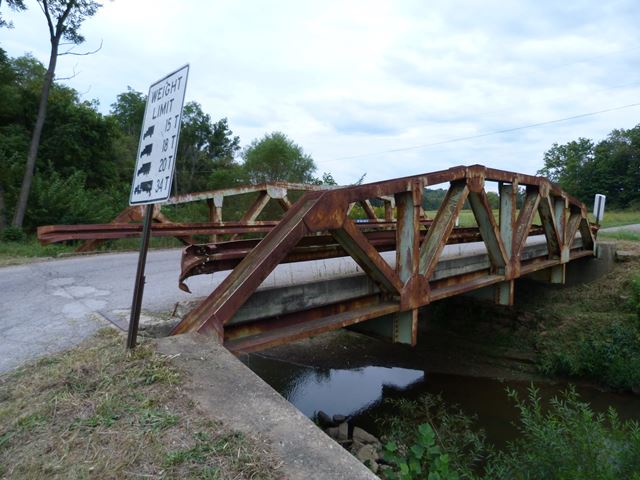We Recommend:
Bach Steel - Experts at historic truss bridge restoration.
BridgeHunter.com Phase 1 is released to the public! - Visit Now
Thompson Run Road Bridge

Primary Photographer(s): Nathan Holth
Bridge Documented: September 11, 2015
Rural: Muskingum County, Ohio: United States
1952 By Builder/Contractor: Ohio Bridge Corporation of Cambridge, Ohio
Not Available or Not Applicable
54.0 Feet (16.5 Meters)
56.0 Feet (17.1 Meters)
19.7 Feet (6 Meters)
1 Main Span(s)
6038727

View Information About HSR Ratings
Bridge Documentation
This bridge no longer exists!
Bridge Status: Demolished and replaced in 2022.This is a representative example of a fairly old welded truss bridge. Ohio is unusual in that it has a large number of welded truss bridges, having been built from the 1940s to the present day, thanks to a company that is today known as the US Bridge Company and was then known as the Ohio Bridge Corporation.
View Archived National Bridge Inventory Report - Has Additional Details and Evaluation
Information and Findings From Ohio's Historic Bridge InventorySetting/Context The bridge carries a 2 lane road over a stream in a rural area of active farms. Summary of Significance "The one span, 55' long, welded, Warren pony truss with verticals and polygonal upper chords was fabricated by the Ohio Bridge Corporation for the county in 1952. It is finished with a corrugated steel deck and beam guide rail railings inside the truss lines. The abutments are concrete. Ohio Bridge Corporation was started in 1936 as the American Culvert Company at Cambridge by Herman Rogovin, who grew up in Cambridge and attended Case School of Applied Science where he received his BS in mechanical engineering in 1936. American Culvert fabricated and marketed corrugated pipe culverts to the counties and municipalities. The name of the bridge fabrication part of the business was changed to Ohio Bridge Corporation in 1952. While working at the B-29 bomber plant in Cleveland during World War II, Mr. Rogovin formulated ideas about an all-welded pony truss bridge design with rolled section members and welded shop connections that could be erected without expensive false work. He began producing that design in 1946 with the first one being placed at Millersburg (Holmes County). Dardelet bolts, a button-head bolt with a serrated center section were used for field connections. They automatically set themselves when driven in with a sledge and are locked with a nut. The bolts were used to connect sections of the truss lines into a unit and to attach the floorbeams. The pony truss bridge initially conceived by Mr. Rogovin is the one that the company continues to fabricate. Rogovin hired Sid Rockoff of Varo Engineers in Columbus to prepare the calculations and member specifications for standard truss designs in 10-foot increments between 50' to 120' in length. Standard plans were prepared for H12, H15, and H20 loading so the counties and municipalities could purchase the appropriate capacity. Development of weld-connected truss bridges goes hand-in-hand with the development of electric arc-welding. The Westinghouse Electric Co. of Pittsburgh was a leading promoter of the technology and is widely credited with fabricating the nation's first weld-connected truss bridge in 1927-28. The arc-welding industry heavily publicized the technology, and its application to bridges spread rapidly during the 1930s. Pre-World War II examples are not rare. Ohio's 1951-1960 examples are a continuation of a design that was well established in the state during the 1940s. Identified historic examples from 1941-1950 include 8 select Warren pony truss bridges (7 of them with polygonal top chords), 2 Pratt pony truss bridges, and 1 Pratt thru truss bridge. This example, with no innovative or distinctive details, is an example of a common standardized design in the state and is not historically or technologically significant." Bridge Considered Historic By Survey: No |
![]()
Photo Galleries and Videos: Thompson Run Road Bridge
Bridge Photo-Documentation
Original / Full Size PhotosA collection of overview and detail photos. This gallery offers photos in the highest available resolution and file size in a touch-friendly popup viewer.
Alternatively, Browse Without Using Viewer
![]()
Bridge Photo-Documentation
Mobile Optimized PhotosA collection of overview and detail photos. This gallery features data-friendly, fast-loading photos in a touch-friendly popup viewer.
Alternatively, Browse Without Using Viewer
![]()
Maps and Links: Thompson Run Road Bridge
This historic bridge has been demolished. This map is shown for reference purposes only.
Coordinates (Latitude, Longitude):
Search For Additional Bridge Listings:
Bridgehunter.com: View listed bridges within 0.5 miles (0.8 kilometers) of this bridge.
Bridgehunter.com: View listed bridges within 10 miles (16 kilometers) of this bridge.
Additional Maps:
Google Streetview (If Available)
GeoHack (Additional Links and Coordinates)
Apple Maps (Via DuckDuckGo Search)
Apple Maps (Apple devices only)
Android: Open Location In Your Map or GPS App
Flickr Gallery (Find Nearby Photos)
Wikimedia Commons (Find Nearby Photos)
Directions Via Sygic For Android
Directions Via Sygic For iOS and Android Dolphin Browser
USGS National Map (United States Only)
Historical USGS Topo Maps (United States Only)
Historic Aerials (United States Only)
CalTopo Maps (United States Only)

